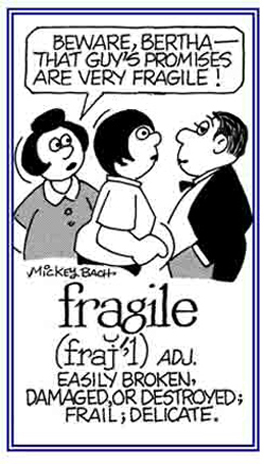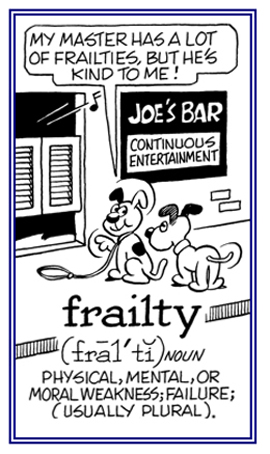frag-, frang-, fract-, fring-
(Latin: break, breaking; broken; cracked)
fracturing (adjective), more fracturing, most fracturing
1. A descriptive term for the appearance on the surface of a freshly broken mineral or rock: The freezing winter weather was so severe up in the mountains that in the spring, geologists found many fracturing cracks in the stones.
2. A reference to the process of producing natural gas from man-made cracks in the earth: Fracturing systems are used to produce gas, including fluids that are pumped into formations under the ground with extremely high pressure to create or to enlarge the openings so gas can flow out.
2. A reference to the process of producing natural gas from man-made cracks in the earth: Fracturing systems are used to produce gas, including fluids that are pumped into formations under the ground with extremely high pressure to create or to enlarge the openings so gas can flow out.
fragible (adjective), more fragible, most fragible
Descriptive of something which is easily broken, damaged, or destroyed; frail.
fragile (adjective), more fragile, most fragile
1. Referring to something that does not have a strong structure or is not made of robust materials, and therefore is easily broken or damaged: The old diaries were very fragile and Grace had to be very careful when she turned the pages because they were exceptionally dry and brittle.
2. Relating to anyone or anything that is unlikely to withstand any severe stresses and strains: David and Karon decided not to have any children because they both had fragile conditions and didn't feel strong enough physically to deal with children.
3. Pertaining to a person's weak bodily condition; usually, as a result of an illness: After Bob's operation and having spent many weeks in rehab, he was very fragile when he finally came home and couldn't do any physical work.

© ALL rights are reserved.
Go to this Word A Day Revisited Index
2. Relating to anyone or anything that is unlikely to withstand any severe stresses and strains: David and Karon decided not to have any children because they both had fragile conditions and didn't feel strong enough physically to deal with children.
3. Pertaining to a person's weak bodily condition; usually, as a result of an illness: After Bob's operation and having spent many weeks in rehab, he was very fragile when he finally came home and couldn't do any physical work.

Go to this Word A Day Revisited Index
so you can see more of Mickey Bach's cartoons.
fragilely (adverb), more fragilely, most fragilely
1. Relating to that which is lacking physical or emotional strength; very delicate.
2. Referring to a substance that is lacking potency or degree of concentration.
2. Referring to a substance that is lacking potency or degree of concentration.
1. Anything that is easily shattered, broken, or damaged.
2. Something that is lacking in substance or force; flimsy.
2. Something that is lacking in substance or force; flimsy.
fragment (noun), fragments; synonyms: debris, débris; rubbish; rubble; trash
1. A part that is broken off something or left when anything is shattered.
2. Something that is broken or separated into pieces or small parts.
2. Something that is broken or separated into pieces or small parts.
- debris, useless accumulation of miscellaneous particles; waste in the form of fragments: "When the earthquake stopped, rescuers started to dig through the debris in search of survivors."
- rubbish, things that are no longer useful, or wanted, and that have been thrown out; trash: "Please pick up all of the rubbish that has been collecting in the back yard."
- rubble, broken pieces of stone, rock, etc. from walls or buildings that have fallen: "After the earthquake reduced the town to débris, rescue workers managed to pull some injured people out of the rubble."
- trash, things that are no longer useful or wanted and that have been thrown away; informal, something that is very low in quality: "Trash was scattered all around in his yard and he spent most of his time watching TV trash and even trashing his living quarters."
fragmental (adjective)
Consisting of broken pieces; not complete; disconnected.
fragmentarily (adverb)
A reference to that which is made up of small pieces; disconnected parts; or which is incomplete.
fragmentary (adjective)
Of the nature of, or composed of, pieces; not complete or entire; disconnected or disjointed parts.
fragmentate (verb), fragmentates; fragmentated; fragmentating
To break something apart into pieces.
1. In computer science, the scattering of parts of a file throughout a disk, as when the operating system breaks up the file and fits it into the spaces left vacant by previously deleted files.
2. The process of shattering or breaking up or being split up into fragments or broken pieces.
3. The loss of unity and cohesion and the splitting of something into isolated and often conflicting parts.
2. The process of shattering or breaking up or being split up into fragments or broken pieces.
3. The loss of unity and cohesion and the splitting of something into isolated and often conflicting parts.
fragmentize (verb), fragmentizes; fragmentized; fragmentizing
To break or to cause something to break into pieces: While Samual was helping his mother remove dishes from the dining table after dinner, a plate accidentally fell onto the floor and fragmentized into tiny bits and parts.
frail (adjective)
1. In a physically weakened state and vulnerable to injury; having delicate health; not robust; weak; such as, there are several frail elderly people in the nursing home.
2. Something that is made of weak or delicate materials and easy to break or damage.
3. Lacking any secure foundation in fact or reality and unlikely to be realized or be successful.
4. Morally weak or easily tempted and persuaded to do something morally bad or wrong.
5. Etymology: "morally weak", from Old French frele which came from Latin fragilis, "easily broken".
2. Something that is made of weak or delicate materials and easy to break or damage.
3. Lacking any secure foundation in fact or reality and unlikely to be realized or be successful.
4. Morally weak or easily tempted and persuaded to do something morally bad or wrong.
5. Etymology: "morally weak", from Old French frele which came from Latin fragilis, "easily broken".
1. The condition of being physically weak or delicate in health or body; especially, from old age.
2. Easily broken or destroyed; fragile.
2. Easily broken or destroyed; fragile.
A quality or condition of being weak, having a physical weakness or a lack of strength: The frailty of Maria's elderly mother appeared to make her weak and vulnerable.

© ALL rights are reserved.
Go to this Word A Day Revisited Index
Some people are concerned about the frailty of their country's economy.



